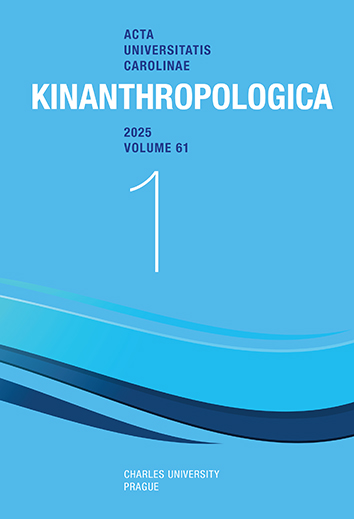Acta Universitatis Carolinae Kinanthropologica (AUC Kinanthropologica) is an international peer reviewed journal for the publication of research outcomes in the humanities, the social sciences and the natural sciences, as applied to kinathropology. It is a multidisciplinary journal accepting only original unpublished articles in English in the various sub-disciplines and related fields of kinanthropology, such as Anthropology, Anthropomotorics, Sports Pedagogy, Sociology of Sport, Philosophy of Sport, History of Sport, Physiology of Sport And Exercise, Physical Education, Applied Physical Education, Physiotherapy, Human Biomechanics, Psychology of Sport, Sports Training and Coaching, Sport Management, etc. The journal also welcomes interdisciplinary articles. The journal also includes reports of relevant activities and reviews of relevant publications.
The journal is abstracted and indexed by CNKI, DOAJ, EBSCO, ERIH PLUS, SPOLIT, SPORTDiscus, and Ulrichsweb.
AUC KINANTHROPOLOGICA, Vol 50 No 1 (2014), 93–99
Analysis of Physical Education Students’ Emotional Stability and Reactibility
Radka Peřinová
DOI: https://doi.org/10.14712/23366052.2015.9
published online: 03. 03. 2015
abstract
Analysis of Physical Education Students’ Emotional Stability and Reactibility This paper will aim to show the possible association between emotional stability and reaction time variability of Physical Education students. It can be stated that our study confirmed our suppositions which were based on works that have focused on similar topics. Our research sample showed the expected characteristics: primarily lower neuroticism values and higher extraversion when compared to the non-sporting population. Emotional stability which was reflected in the neuroticism dimension in EPQ-R (Eysenck Personality Questionnaire) was shown to be connected with variability of the reaction time in the test of reactability to selected visual stimulus, disregarding the reaction rate. The effect of extraversion is partly reflected by the tendency of the sanguine temperament type to react in a balanced manner (i.e. with low reaction time variability) during the reactability test. Due to the relatively low number of other temperament types in our sample, it is not possible to draw any conclusions in this regard. Analýza emocionální stability a reaktibility studentů tělesné výchovy Tento příspěvek poukazuje na možnou asociaci mezi emocionální stabilitou a časovou variabilitou dob reakcí u studentů tělesné výchovy. Lze konstatovat, že studie potvrdila naše předpoklady vycházející z odborných prací na obdobná témata. Výzkumný soubor vykazoval předpokládané charakteristiky, především nižších hodnot neuroticismu a vyšší extroverze oproti nesportující populaci. Emocionální stabilita vyjádřená pomocí dimenze neuroticismu (v EPQ-R) se ukázala v asociaci s časovou variabilitou dob reakcí v testu reaktibility na výběrový zrakový podnět bez ohledu na rychlost reakce. Vliv extroverze do jisté míry odráží naznačená tendence sangvinického typu temperamentu reagovat vyrovnaně (tedy s nízkou časovou variabilitou dob reakcí) v testu reaktibility. Vzhledem k relativně nízkému početnímu zastoupení ostatních typů temperamentu v našem souboru nelze v tomto ohledu činit zodpovědné závěry.
keywords: neuroticism; reaction time variability; EPQ-R neuroticismus; časová variabilita dob reakcí; EPQ-R
references (21)
1. Allport, G. W. (1961). Pattern and growth in personality. New York: Holt, Rinehart and Winston.
2. Brebner, J. T. (1980). Reaction time in personality theory. In A. T. Welford (Ed.), Reaction Times. New York: Academic Press, 309–320.
3. Deary, I. J., Der, G. & Ford. G. (2001). Reaction times and intelligence differences: A population-based cohort study. Intelligence, 29 (5), 389–393. CrossRef
4. Eysenck, H. J. (1967). The biological basis of personality. Springfield, IL: Charles C. Thomas.
5. Eysenck, H. J. & Sibil, B. G. (1968). Eyseneckov osobnostný dotazník. Bratislava: Psychodiagnostické a didaktické testy.
6. Eysenck, H. J. (1993). Eysenckovy osobnostní dotazníky. Praha: Psychodiagnostika.
7. Hendl, J. (2004). Přehled statistických metod zpracování dat. Praha: Portál.
8. Kirkcaldy, B. D. (1982). Personality profiles at various levels of athletic participation. Personality and Individual Differences, 3, 321–326. CrossRef
9. Knotek, P. & Kubička, L. (1971). Závislosti medzi tělovýchovnou aktivitou a některými vlastnostmi osobnosti poslucháčů tělesné výchovy pedagogických fakult. Teor. praxe tel. výchovy, 20, 129–138.
10. Koitka, J. (2003). Torhüter von morgen ausbilden: Bausteine für das Einzeltraining der Torwarte, Teil 3: Reaktion, Komplexübungen.
11. Lehnert, M. & Dobrý, L. (1994). Reakční doba a zpracování informací. TVSM, 60 (3), 2–10.
12. Lemieux, P., McKelvie, S. J., & Stout, D. (2003). Extraversion and Neuroticism in Contact Athletes, No Contact Athletes and Non-athletes: A Research Note. Athletic Insight, 5 (3), online [cit. 2007-06-13]. Dostupný z http://www.athleticinsight.com/Vol5Iss3/ExtraversionNeuroticism.html.
13. Lenzenweger, M. F. (2001). Reaction time slowing during high-load, sustained-attention task performance in relation to psychometrically identified schizotypy. Journal of Abnormal Psychology, 110. CrossRef
14. Miller, J. O. & Low, K. (2001). Motor process in simple, go, no-go, and choice reaction time tasks: a psychophysical analysis. Journal of Experimental Psychology: Human Perception and Performance, 27.
15. Robinson, M. C. & Tamir, M. (2005). Neuroticism as mental noise: a relation between neuroticism and reaction time standard deviations. Journal of Personality and Social Psychology 89 (1), 107–115. CrossRef PubMed
16. Sanders, A. F. (1998). Elements of Human Performance: Reaction process and Attention in Human Skill. Mahwar, New Jersey: Lawrence Erlbaum Associates, Publisher.
17. Schweitzer, K. (2001). Preattentive processing and cognitive ability. Inteligence 29. CrossRef
18. Stejskal, T. (1994). Rözne typy reagovania. Tel. vých. sport mlád., 60, 39–41.
19. Stejskal, T. (1998). Reaktibilita športovcov. Prešov: Manacon.
20. Vaněk, M., Hošek, V. & Svoboda, B. (1974). Studie osobnosti ve sportu. Praha: UK.
21. Welford, A. T. (1980). Choice reaction time: Basic concepts. In A. T. Welford (Ed.) Reaction Times. New York: Academic Pres.
157 x 230 mm
periodicity: 2 x per year
print price: 190 czk
ISSN: 1212-1428
E-ISSN: 2336-6052
